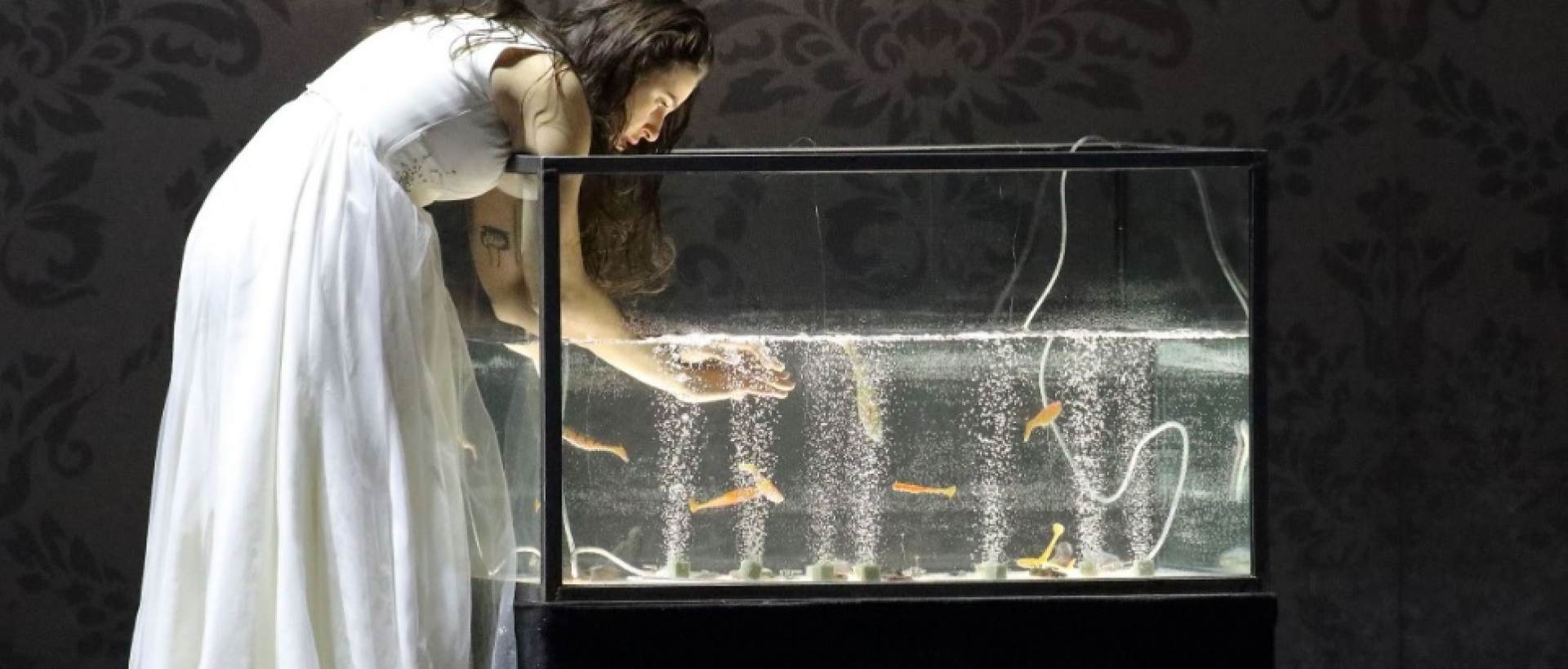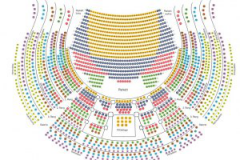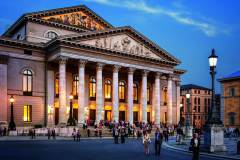Rusalka
July 2026 | ||||||
|---|---|---|---|---|---|---|
Mo | Tu | We | Th | Fr | Sa | Su |
Composer Antonín Dvorák. Libretto by Jaroslav Kvapil.
Lyric fairytale in three acts (1901)
recommended for 16 years and older
In Czech language. With German and English surtitles.
Rusalka feels trapped in a world from which there is no escape. She is ready to put her immortality on the line in return for a human soul, so she can gain the love of a handsome prince. But she must pay for it with her voice. Muted and liberated from her dark world, she is forced to watch as the prince rejects her in favor of a foreign princess – dooming them both. She cannot live, she cannot die, yet nevertheless at the end, she helps the prince find his death with a “rescuing” kiss.
In their opera Rusalka, which premièred in 1901, Antonin Dvořák and his librettist Jaroslav Kvapil mixed the Slavic myth of the undead vengeful woman from the water with such storybook characters as Friedrich de la Motte Fouqué’s Undine and Hans Christian Andersen’s Little Mermaid. The fascinating musical worlds, the lyrical and highly dramatic moments came together to make Rusalka one of the most successful Czech operas ever written.
Synopsis
Act 1
A meadow by the edge of a lake
Three wood-sprites tease the Water-Goblin, ruler of the lake. Rusalka, the Water-Goblin's daughter, tells her father she has fallen in love with a human Prince who comes to hunt around the lake, and she wants to become human to embrace him. He tells her it is a bad idea, but nonetheless steers her to a witch, Ježibaba, for assistance. Rusalka sings her "Song to the Moon", asking it to tell the Prince of her love. Ježibaba tells Rusalka that, if she becomes human, she will lose the power of speech and moreover that, if she is betrayed by the prince, both of them will be eternally damned. Rusalka agrees to the terms and drinks a potion. The Prince, hunting a white doe, finds Rusalka, embraces her, and leads her away, as her father and sisters lament.
Act 2
The garden of the Prince's castle
A Gamekeeper and his nephew, the Kitchen-Boy, note that the Prince is to be married to a mute and nameless bride, suspecting witchcraft and doubting it will last, as the prince is already lavishing attentions on a Foreign Princess who is a wedding guest. The Foreign Princess, jealous, curses the couple. The prince rejects Rusalka. The Water-Goblin takes Rusalka back to his pond. The Foreign Princess, having won the Prince's affection, now scorns it.
Act 3
A meadow by the edge of a lake
Rusalka asks Ježibaba for a solution to her woes and is told she can save herself if she kills the Prince with the dagger she is given. Rusalka rejects this, throwing the dagger into the lake. Rusalka becomes a bludička, a spirit of death living in the depths of the lake, emerging only to lure humans to their deaths. The Gamekeeper and the Kitchen Boy consult Ježibaba about the Prince, who, they say, has been betrayed by Rusalka. The Water-Goblin says that it was actually the Prince that betrayed Rusalka. The wood-sprites mourn Rusalka's plight. The Prince, searching for his white doe, comes to the lake, senses Rusalka, and calls for her. He asks her to kiss him, even knowing her kiss means death and damnation. They kiss and he dies; and the Water-Goblin comments that "All sacrifices are futile." Rusalka thanks the Prince for letting her experience human love, commends his soul to God, and returns to her place in the depths of the lake as a demon of death.
Program and cast
Conductor: Edward Gardner
Production: Martin Kušej
Set Design: Martin Zehetgruber
Costume Design: Heidi Hackl
Lighting: Reinhard Traub
Choruses: Franz Obermair
Dramaturgy: Olaf A. Schmitt
Der Prinz: Pavol Breslik
Die fremde Fürstin: Elena Guseva
Rusalka: Svetlana Aksenova
Der Wassermann: Christof Fischesser
Die Hexe: Christine Rice
Der Förster: Kevin Conners
Der Küchenjunge: Ekaterine Buachidze
1. Waldnymphe: Mirjam Mesak
2. Waldnymphe: Arnheidur Eiríksdóttir
3. Waldnymphe: Natalie Lewis
Ein Jäger: Vitor Bispo
National Theatre Munich
The National Theatre Munich (German: Nationaltheater München) is an opera house in Max-Joseph-Platz in Munich, Germany. It is the home of the Bavarian State Opera and the Bayerisches Staatsballett(Bavarian State Ballet).
The Bavarian State Opera also performs in the Prinzregententheater, which opened in 1901 and, like the Bayreuth Festspielhaus, is built to Richard Wagner's specifications, and in the Cuvilliés Theatre at the Residenz, constructed in 1751–1753 and described by Thierry Beauvert as "a Rococo gem".
The Nationaltheater is very easy to get to both by car and by MVV public transportation.
By MVV public transportation
S-Bahn: S 1 - 8 Marienplatz
U-Bahn: U 3, 6 Marienplatz, U 3 - 6 Odeonsplatz
Bus: 52, 131 Marienplatz, 100 Odeonsplatz
Straßenbahn: 19 Nationaltheater
On the day of the performance, holders of regular tickets are entitled to use public transport provided by the Münchner Verkehrsverbund (MVV). This service starts at 3 pm respectively three hours before the performance commences and ends with the closing hour of the MVV.
By Car
Take the Altstadt-Ring to Maximilianstraße.
Parking garage Max-Joseph-Platz: open Monday to Sunday from 6:00 A.M. to 2:00 A.M.
You can take advantage of the special theatre parking fee of Euro 10,- from 6:00 P.M. to 8:00 A.M. by presenting your admission tickets.

 EN
EN DE
DE IT
IT FR
FR ES
ES RU
RU JP
JP RO
RO
 Seating plan
Seating plan 